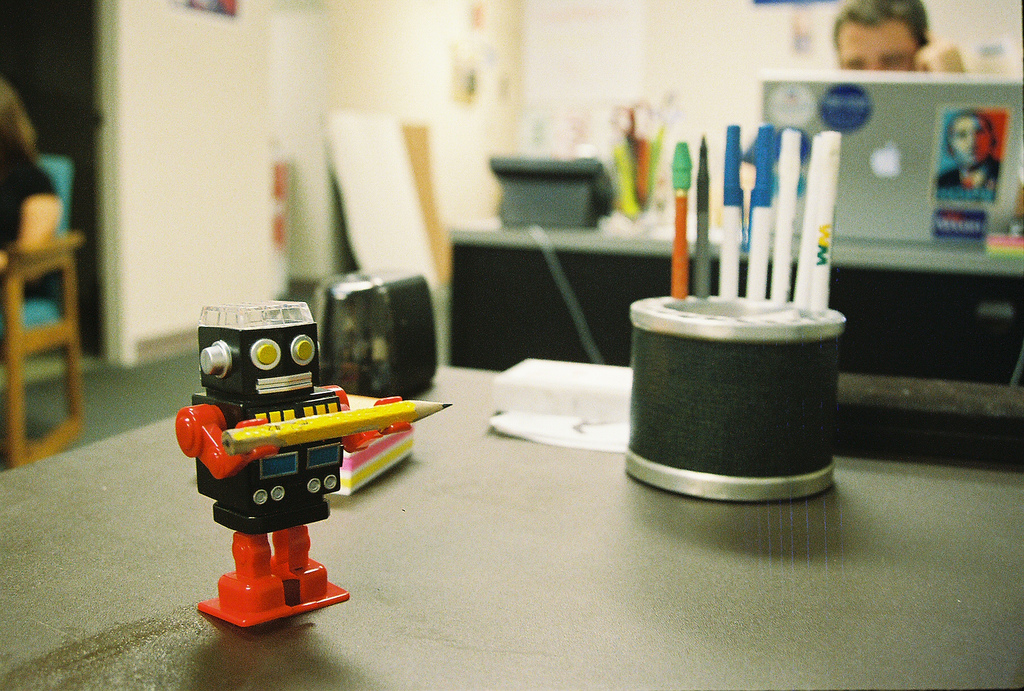Marketing is understood as a “people industry.” It takes a certain kind of human ingenuity to cut through to our persuadable hearts—to make us want a product, watch a video, or click a link. If you asked a machine to put together a Super Bowl ad whose return would far outweigh its pricey buy, the end result would probably resemble an uncreative, pandering infomercial—a monotone voice explaining the merits of said product. Direct and to the point, but we are complicated creatures. Advertising in the 21st century is subtle, designed to cut through the torrent of noise we are blasted with daily in the digital age.
However, according to experts, we’re only in the “Second Machine Age” (imagine the Third or Fourth!) and that has already brought about a wealth of possibilities for computer automation and creativity. Machines can now answer student questions, serve as personal assistants, evaluate human performance, beat chess champions, write legal documents, and proofread essays (such as this one). They can even detect emotions from voice. And that’s just the beginning: In their book The Second Machine Age, Andrew McAfee and Erik Brynjolfsson say, “Computers are going to continue to improve and to do new and unprecedented things.”
Computers have undoubtedly been helpful for marketing. This is a boon to marketing managers, who normally would have to assign someone such a tedious task. It also takes advantage of the one key additive to the marketing industry in the 21st century: big data. Marketing used to rely on assumptions and gut instincts, but now (and probably for the better) it relies on objective, indisputable data. The more data, the more automation is possible, and one can now deploy a machine to sift through it all rather than some bumbling 20-something fresh out of college.
But will this make all marketing jobs irrelevant? No. Most likely, it will go the way of other industries, with machines doing most of the rote work, and human advisors supplying the creativity, management, and oversight. According to Oxford University robotics expert Dr. Anders Sandberg, if you can describe your job, then your job can and will be automated. In the future, he claims, 47% of all jobs will be replaced by software, with those that can most easily be described being the first to go.
Therefore, the parts of marketing that are the easiest to describe—identifying target audiences, sending mass emails, writing press releases—will go the way of machines. Already in our lifetimes, we’ve seen customer service hotlines supplemented with machine assistants. Soon, they will be all digital. But the more abstract parts of marketing—composing a campaign, coming up with creative catchphrases, and the like—will stay in the domain of humans, who will use machines to be the most effective marketers they can possibly be.
In fact, it seems that marketing is rocketing towards the best of both worlds in the 21st century. If one relies only on intuition, as many advertisers and marketers used to, they could easily be seen as ignorant and fail to reach their target audience. If they rely on too much data, as machines do when they show you an advertisement on your laptop for a Christmas sweatshirt you Googled on your friend’s phone two weeks ago, they can come off as creepy. But one can imagine a perfect tandem: machines delivering huge amounts of organized data to a human, who caps it off with creative insight to craft the perfect marketing campaign.
Therefore, machines may replace “marketer,” but certainly not “manager,” anytime soon.
Charles Dearing is a veteran tech and marketing journalist with over 15 years of experience using words to move people to act. He has written for various publications such as ProBlogger, Big Think, Apps World, to name a few. Connect with him on Twitter.
